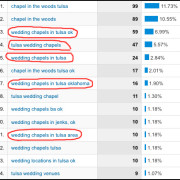Web Developers Stand Up
While eating some chocolate donuts this morning with my son, it dawned on me that each miniature donut was identical. All the same size, shape, taste, etc. I thought to myself, “what if all web content developers put ample, and equal time on each web project dedicated to search engine optimization for the site?” Well, it would definitely make the fight to get on Google’s first page much more difficult. The content online everywhere would be so relevant and the searches would be so close together in similarity that one listing would not stand head and shoulders above the other searched results, as it does now.
Well, the truth is, most web designers do just that – they design websites. Developing a website entails much more than just throwing some files on the server and invoicing the client. Proper SEO practices are not followed by all. One firm that we took over a website at the request of the client put together a really nice site, but even after it was launched for over a month, there were no title tags, no descriptions or key words; just nothing but some text and some graphics. When I asked him why they didn’t do any of it, his reply was, “We kinda ran out of time.” 2 weeks after we optimized the site, it was all over the first page of Google and the other major indexes. That company is no longer in business.
Ask yourself, as a content developer, do you skip necessary steps to ensure that your site will be successful and generate leads and sales for a client? Is it laziness or lack of knowledge? Well, we can’t fix your laziness, but below is a list of things that should happen on each web project or online endeavor that will assuredly saturate your presence on the first page of Google’s search.
- Frequently post new and current content on your website, blog(s), social media sites, and forums. Especially the home page of your website.
- Use different formats to deliver your content to stay fresh and keep audience interest levels high. i.e. blog, whitepapers, newsletters, webinars, podcasting, video etc.
- Test and track everything you do. Google Analytics is free and more than powerful enough to provide the metrics you need to track your efforts online.
It will take some extra time to either do this work or teach a client to do it, but in the end will make all the difference.





















